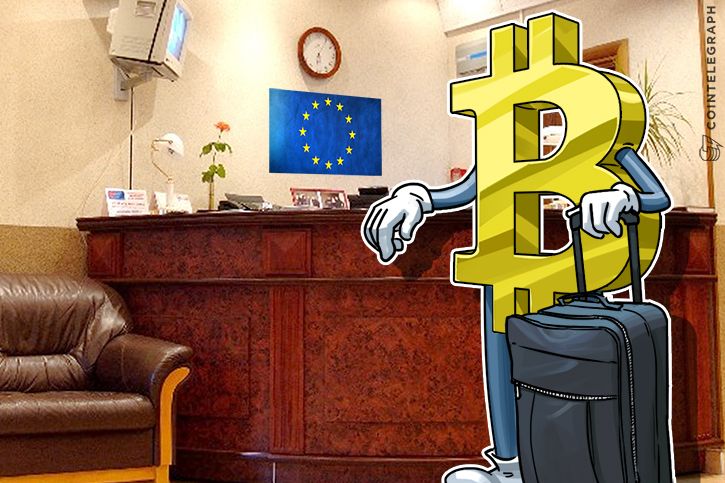Americans Skeptical of Bitcoin, Asia Surpasses US, Europe in Fintech Investments
Finder.com has recently conducted a study to examine the current trends in the international money transfer space. Olivia Chow, the company’s Lead Researcher had a chat with Cointelegraph revealing key findings of the study.
34 percent of Americans transfer money overseas
According to data collected by finder.com, 34 percent (or 84.1 mln) of Americans transfer money overseas. That is an estimated $140.1 bln last year alone, more than half amounts for mortgages, student loans and credit card debt.
Another set of data reveals that while the general population seems to be embracing digital wallets for day-to-day transactions (57 percent use a digital wallet more than any other mean), 80 percent of all money transferred overseas is still done in person using cash. This is topped with a figure of 96 percent representing those who are unhappy with the level of service they receive. Finder.com launched an in-depth research to identify the reasons behind dissatisfaction with money transfer services, as well as to understand why the in-person approach is still favoured when it comes to international money transfers.
Chow explained the methodology used:
“Because we are an online company, we focused on Money Transfer Operators (MTOs) — non-bank institutions that send global payments — that have web applications and allows for transfers to be completed entirely online. We spent three months sending live transfers to France and Mexico, generating quotes on 2,430 transactions, conducting usability research with 39 participants from usertesting.com and site testing to verify 585 data points collected from provider websites.”
Six most important factors in money transfer
Based on users’ money transfer concerns and needs, finder.com has developed the six most important factors when transferring money. These included exchange rates, the speed of transfer, user experience, trustworthiness, convenience and novelty of the product. These six factors corresponded to six award categories. The study demonstrated that the average score for best user experience was the highest, while the average score for Most Convenient and Most Trustworthy was lowest.
Chow explained:
“The high UX scores is a departure from most banking sectors but this is because we only focused on Money Transfer Operators (MTOs) who are not big banks. They specialize in one area in banking leading to a better user experience both because of this area of focus and because the need to optimize for the user is required to meet margins.”
According to the study findings, industry veterans do not have the highest online country and territory coverage, although, as Chow says, they would if cash pick-up payments (not bank accounts) were included in the study.
She shared:
“For instance, SmallWorld had the highest coverage with 83 countries and territories, but that’s less than half of the world’s 195+ countries and territories. TransferWise and WorldRemit came in second with 74 countries and territories. Western Union had 59 and Paypal 38. The bottleneck here are the specific regulations between different countries. Altcoins could prove a possible accelerator in this adoption. The unbanked recipients also make moving away from cash slow, offering another opportunity for cryptocurrencies.”
An Analysis also revealed the lack of transparency with most of the providers of money transfer services. Thus, two in five providers (40 percent) didn’t transfer funds within the promised delivery time. 31 percent of providers tested did not have successful transfers, they used wire transfers or forced customers to load funds onto a digital wallet before being able to transfer. 31 percent forced customers to provide their personal details before offering an online quote.
As stated by Chow, a perception of trust is a two-way street — people who receive payments must be comfortable with the way they receive. Given all this, what are the chances cryptocurrencies will offer a solution for Americans willing to transact instantly and trustfully?
Americans are skeptical about cryptocurrencies
Describing general habits and preferences of Americans when it comes to money transfers, Chow points out that the biggest determining factor to which service to use is what is convenient to use for those receiving the money. As a result, digital wallets have taken off in the US — the Venmos, Facebook Messenger, and Google Pay. These apps are even marketed as social tools which make it easier to split a dinner bill, for example.
Chow continues:
“However, when it comes to international money transfers, the recipients are often less savvy and possibly without bank accounts. As a result, the resistance for digital adoption is much greater leading to international money transfers from the US still largely being conducted in cash.”
While there is certainly a niche which can be occupied by cryptocurrencies, Chow says that in the US, cryptocurrencies are met with some degree of scepticism among the general public. She believes there are at least two reasons for that.
Is Bitcoin going to overturn the current financial system?
According to Chow, the US economic system is relatively stable. Although the Great Depression was painful for many Americans and “too big to fail” was the supposed harbinger for Satoshi Nakamoto’s invention, the day-to-day relationship with money remained constant.
Chow says:
“The bank didn’t run, people weren’t concerned that their greenbacks suddenly weren’t going to be worth anything, and your ATMs, online banking, and other daily banking mechanisms continued to operate. Ultimately, the need for an alternative currency is not dire.”
At the same time, in many developing countries where the national currency sometimes lacks stability and the government is corrupted. Interest in cryptocurrencies seem to increase as a result of greater volatility and weakness of the fiat. The Indian cash crisis is a perfect example of when Bitcoin volumes have soared.
The second reason for general public’s scepticism towards Bitcoin, according to Chow, is the binary thinking Americans have developed:
“Is Bitcoin going to overturn the current financial system or not? There seems to be a narrative that if it doesn’t do that then it’s a total failure. But if it can buoy economies during a financial crisis and provide an alternative, I think that is certainly filling a need today.”
Indeed, it is still unclear whether this decentralised currency experiment will succeed or just collapse — only time will tell. So far cryptocurrencies do seem to be addressing a growing need for an alternative to the mainstream markets when the latter are in peril.
Why national altcoins failed
Speaking of the instability of national currencies, recently we have witnessed an emergence of a new generation of cryptocurrencies focusing on building money system to solve problems of a specific country (Auroracoin, Scotcoin, Gaelcoin, etc.). While many critics were saying that these initiatives are not able to overturn traditional finance and settlement systems, there was a significant share of supporters.
Chow shared her opinion:
“I think it’s fair to say that those specific national altcoin initiatives have peaked and were unsuccessful. A lot of them rose in critique of limitations and failures of their own currency, but why create a cryptocurrency based on a nation state? When the whole idea is to decentralize and create fewer boundaries between transactions? At the same time, these were largely popular in 2014 when Bitcoin had thought to have failed. So, experimenting with different new cryptocurrencies could have made sense to alleviate the problems of the mainstream economy.”
Today Bitcoin is showing strength with an overall uptrend leading those in volatile markets to opt into Bitcoin, rather than create an entirely new currency. Besides, money transfer services are even taking advantage of the cheaper exchange rates offered by Bitcoin’s separate market. As Chow says, still sometimes the rates are worse, but it’s always good to have alternatives.
Crypto and fiat can’t be compared
Cryptocurrency market is definitely maturing, which is demonstrated by the increasing cryptocurrency market cap. Last year, Bitcoin even managed to outperform many traditional currencies raising hopes that digital currencies are indeed the future of money.
Chow commented:
“I think we need to define “outperform.” How much a currency is worth is dependent on what the cost of goods it can buy. That is still limited and difficult to measure when it comes to Bitcoin — especially legally. Strictly based on market cap and price, yes, Bitcoin more than doubled last year. But until Bitcoin is accepted more widely as payment (which it is starting to) I think it’s unfair to compare them with fiat currencies.”
Fintech is prioritized: lessons from Asia
Cointelegraph was interested to know Chow’s opinion on the fintech boom in Asia, and particularly in China. Last year Asia managed to surpass the US and Europe in terms investment volume in fintech industry reaching $1.2 bln versus $900 mln in the US and $200 mln in Europe.
Chow says:
“Indeed, Asia surpassed the US and Europe in venture capital but the year-end investments ended up being much larger in the four and five billions for each — higher in you include other sources of investment. Although Asia surpassed the US in total investment, Asia made fewer deals. This is not necessarily bad but reflects how much more unified their strategy appears to be — investing in fewer companies but more heavily.”
Chow recalls that one of the biggest investments last year was into Ant Financials, the payment arm of Alibaba group. They recently just bought Moneygram, and Chow says it will be interesting to watch:
“They seem to historically be more focused on cash payments but this could dramatically change by this time next year. Furthermore, Alibaba Group’s CEO Jack Ma has been quite vocal about his belief that businesses need to invest in the infrastructure of their own countries.”
After all, it seems in today’s increasingly digital and global market, fintech is being made a priority.
Chuck Reynolds
Contributor









